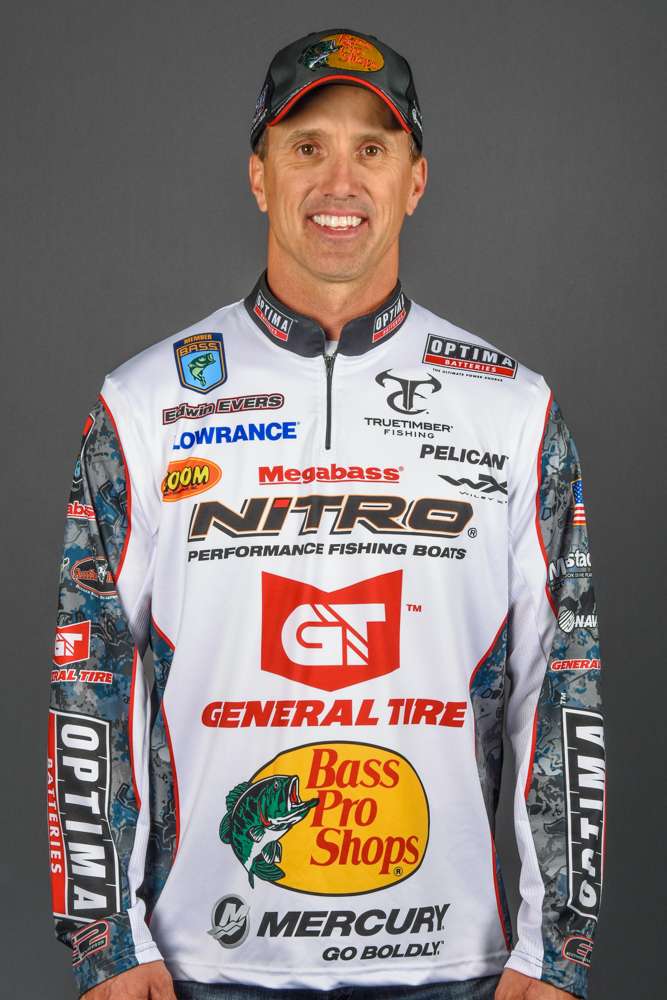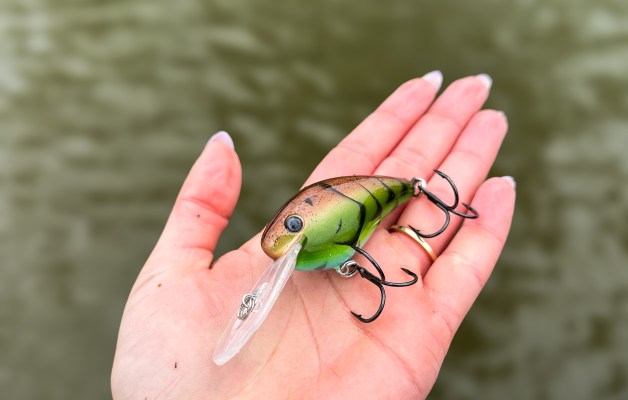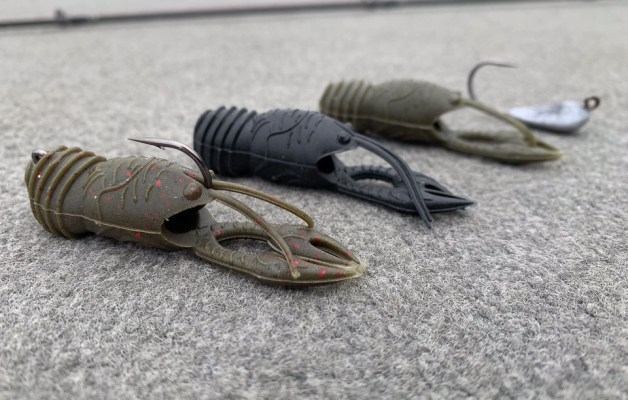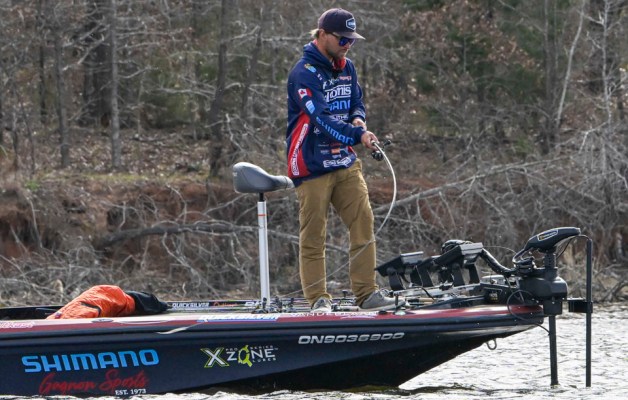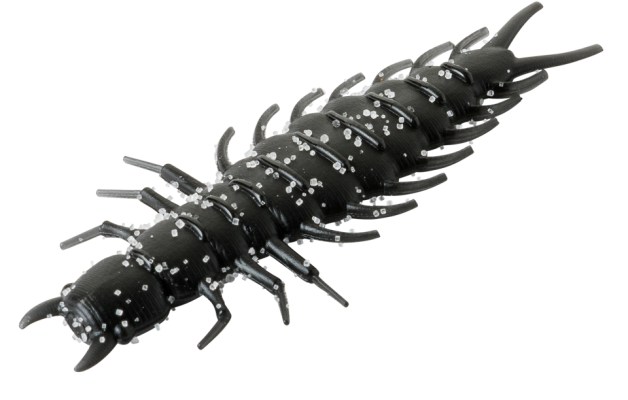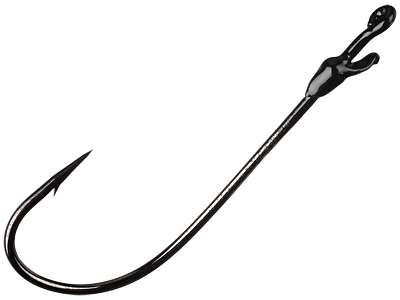
When you get right down to it, we don’t catch bass on lures or live baits. We catch them on hooks — single hooks, treble hooks, even double hooks. Without hooks, we simply don’t catch bass.
Which is why it’s so surprising that otherwise good anglers don’t put more emphasis on the hooks they use. For me and most of the Bassmaster Elite Series anglers, hooks are a big deal.
If you’re an experienced bass angler, you know that you need to match the hook you’re using with the application or method you’re fishing. Mismatched hooks are a sure way to lose fish — if you can even get them to bite.
A lot goes into my choosing the right hook for the job, and I carry a lot of hooks with me when I fish a tournament. Few things are more frustrating than not having the right tool for the job, and hooks are among the most important tools an angler uses.
Today’s hooks are mostly a lot better than the hooks that were available on the market when I was just getting into fishing. Back then, every serious angler carried a hook hone or whetstone with him just to sharpen hooks as they were used throughout the day.
Today’s hooks are much sharper and much stronger than those of 20 or 30 years ago. In fact, they’re so much sharper, that it usually makes more sense to throw away a dull hook than it does to try to sharpen it. If you take a premium hook out of the package today and run it over a hone a few times, you haven’t sharpened it — you’ve dulled it!
About the only time I try to sharpen a modern hook is when I’ve noticed something very minor that I think I can quickly and easily fix with just a couple of passes over the sharpening stone. Maybe I detect a burr or some little thing like that. If it’s something more, the solution is simple. Throw that hook away and get a new one.
Since today’s hooks are almost all very sharp, it’s usually other qualities I’m looking for when selecting a hook. One of the big factors is diameter.
Basically, I want hooks that are thin and strong, but those two qualities are typically at the opposite ends of the spectrum from each other. Thin hooks are not the strongest, but they penetrate well on the hookset. Thick hooks are very strong, but it takes more to get good penetration.
Generally, if I’m using light line or making long casts, I’m going to use a light, thin-diameter hook. If I’m using heavy line and fishing close, I can get away with a thicker, heavier hook. But there are exceptions to this general rule.
Single hooks
With soft plastic baits and jigs, we’re generally using single hooks, and since most soft plastics don’t come with hooks, it means we get to match the baits up with the hooks of our choice. No room for excuses here!
I do a lot of pitching and flipping — close-range fishing with heavy line in heavy cover. For that kind of application, I want a really stout hook that won’t bend or flex much. My choice is the Mustad Denny Brauer Grip Pin Max Flippin’ Hook, and most of the time (about 90 percent), I’m using a 4/0 model.
What I like about that hook is that it won’t bend. A big reason for lost fish when flipping and pitching is that your hook “gives” just enough to pull free in heavy cover. It doesn’t happen with this hook.
Now I want to tell you something about my hook selection when flipping and pitching that may surprise you. When I’m pitching and punching heavy cover, I will drop down a size or two (my favorite size is 3/0) because the smaller hook will penetrate the cover better and is less likely to catch on something when I’m trying to pull a bass out of the mat. Most guys want the biggest hook they can get for this method, but not me.
If I’m casting a Texas-rigged worm, I’ll use a lighter hook (like the Mustad Grip Pin Edge Finesse Hook). I like straight-shank hooks, and the Edge has a smaller diameter than the Max Flippin’ Hook. That’s important when you’re making longer presentations and using lighter lines.
When I dropshot, the hook I use depends a lot upon my line size. If I’m using 10- to 14-pound test Bass Pro Shops XPS 100% Fluorocarbon, I like a 1/0 or 2/0 Grip Pin Edge Finesse Hook, and I’ll rig my bait self-weedless above the dropshot weight.
For soft plastic swimbaits, I use the Mustad Power Lock Plus Spring Keeper Weighted Hook. It’s strong, has a good, wide gap, and the lead weight on the shank of the hook can be moved up and down the shank to alter the bait’s action as needed and keep it at the depth I want to fish it.
Next time I’ll cover how I select treble hooks.
Healing Heroes in Action
If you haven’t already heard about it, the “Healing Heroes in Action Tour,” is a program I’ve started to give something back to the military veterans who risk their lives to keep the rest of us safe. On May 28th, we’ll be at Grand Lake in Oklahoma. I hope you’ll join us.
The program is my way of telling our military that my family and I are grateful for what they do. At every Bassmaster Elite Series event, with the help of the Wounded Warriors in Action Foundation, we’re selecting a veteran who suffered injuries during his tour of duty and taking him fishing and giving him some great fishing gear to keep.
You can help.
If you and a friend would like to be involved and make a tax-deductible donation to Wounded Warriors, just visit my Facebook page and enter a bid in the comments area. The top bidder and a friend will go out on the water (in the bidder’s own boat or one arranged for at the site) and compete with me and the selected veteran on Thursday, May 28. You might even beat us!
Our first trip, after the Sabine River tournament, went for about $2,000. You should know that the prize pack my sponsors and I have put together is nothing less than amazing!
It includes a Lowrance HD Elite 7, a $200 gift card to Bass Pro Shops, a tackle bag and solar pack (to keep your cell phone charged or your iPod playing) from Wild River, a selection of Megabass, Zoom and War Eagle lures, some Mustad hooks and a pair of Wiley X sunglasses. The prize pack alone would probably retail for around $2,000, but you get a great on-the-water experience, too, plus knowing that you’re doing a great thing for our veterans.
This event on Grand Lake will be live streamed on Bassmaster.com. If you’re the winning bidder, you can get your catches reported live, just like the Elite pros!
It’s amazing how rewarding this whole experience has been. I feel like I’m doing an important thing while making great friends and having a lot of fun. I hope you’ll get involved, too. I bet you get as much out of it as I do.
For more information, visit me on Facebook or see the post below.
This is it, the official post to begin bidding for the third event of the OPTIMA Batteries Healing Heroes in Action Tour…
Posted by Edwin Evers on Thursday, May 14, 2015

